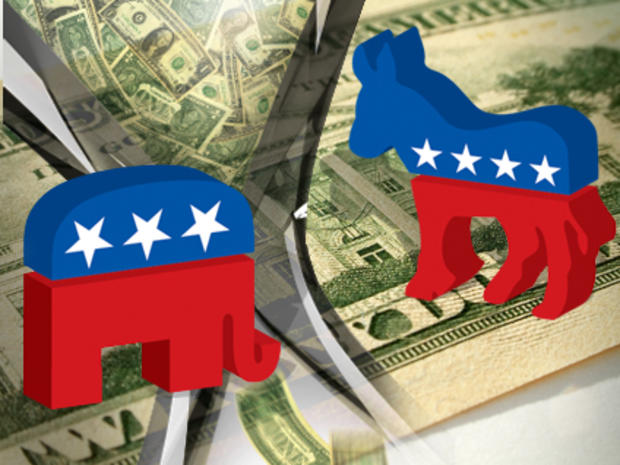Budget fight not over in Congress
Congressional leaders late Friday night managed to agree to a budget for the next six months and avoid a government shutdown -- but the deal isn't officially closed.
On Friday, Congress passed a one-week measure to keep the federal government running while leaders from Congress and the White House worked out the details of a plan for the rest of the fiscal year which cuts a sweeping $38.5 billion from this year's budget. The details of that plan have yet to emerge, but the House is expected to vote on the plan on Wednesday and the Senate on Thursday.
Some lawmakers tell CBS News they're waiting to see the details of the plan before deciding how to vote. At least some House Republicans, however, has said publicly they can't support the deal, in keeping with the Tea Party demands for even larger cuts.
While several politicians from both sides of the aisle could reject the deal, it is still expected to pass with bipartisan support. It nevertheless serves as a prelude to the fiercer spending battles Congress will fight in the coming weeks.
Conservative Rep. Mike Pence of Indiana said on ABC's "This Week" that House Speaker John Boehner "drove a hard bargain" in his negotiations with President Obama and Senate Majority Leader Harry Reid, but he can't support the deal.
"From what I know, it sounds like John Boehner got a good deal," he said. "Probably not good enough for me to support it, but a good deal nonetheless... We were asking for a 2 percent cut in the budget. And that ended up being too much of a cut for this administration and for liberals in Congress."
Rep. Jim Jordan of Ohio, who leads the conservative Republican Study Committee (RSC), told reporters Friday that he will vote against the budget measure and expects some other RSC members to vote against it as well.
There's likely to be resistance from liberal Democrats as well. Forty-two House Democrats, including liberals like Reps. Dennis Kucinich (Ohio) and Keith Ellison (Minn.), the chair of the Congressional Progressive Caucus, joined 28 Republicans Friday night in voting against the measure to keep the government running for another week (while cutting $2 billion along the way).
Leaders in the White House and Congress have released some details of the brokered deal, but more are expected to come out this evening. White House Communications Director Dan Pfeiffer said the deal includes $13 billion in cuts from funding for programs at the Departments of Labor, Education, and Health and Human Services as well as over $1 billion in a cut across non-defense agencies. It also includes reductions to housing assistance programs and some health care programs, as well as $8 billion in cuts from foreign affairs programs.
Additionally, congressional aides confirm to CBS News, the cuts include $2.5 billion from transportation project funding and $17.8 billion from mandatory spending programs -- programs that are mandated outside of the budgetary process, such as Social Security, Medicare, Medicaid and food stamps. The deal also includes a ban on funding to hire more IRS agents and a ban on funding to transfer Guantanamo detainees to the U.S. It also includes a school voucher program for Washington, D.C. and a requirement for the Government Accountability Office to study the new Consumer Financial Protection Bureau, which was formed in the Democrats' Wall Street reform law.
On CBS News' "Face the Nation" on Sunday, Democratic Sen. Charles Schumer said the cuts are "across the board. Everybody gives some pain."
Meanwhile, the New York Times reports, lobbyists and lawmakers are still trying to change certain details of the agreement, such as new rules for profit-making colleges.
As Congress wraps up its work on this budget, it is already jumping into a fight over next year's budget, as well as a vote to raise the national debt ceiling.
Boehner wrote in a USA Today op-ed that this week the House will give its "full attention" to the 2012 proposed budget from House Budget Committee Chairman Paul Ryan (which he called the "Path to Prosperity"), saying the next budget fight will be "about trillions, not billions." Leaders of the Congressional Progressive Caucus, meanwhile, are calling Ryan's plan the "Roadmap to Ruin."
Below: CBS News senior political producer Rob Hendin discusses the budget battle's winners and losers with Democratic strategist Jamal Simmons and Republican strategist Doug Heye

